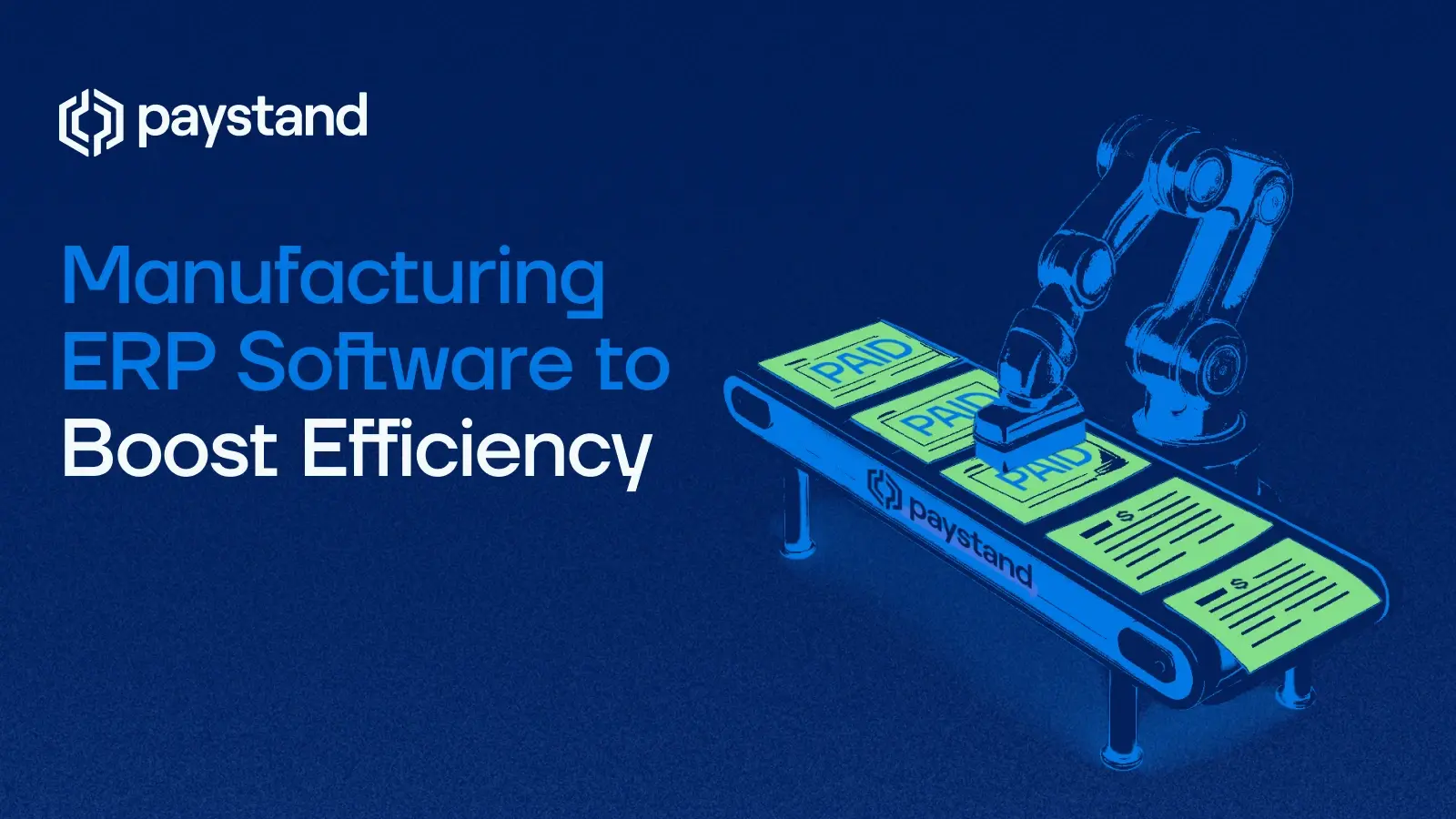Manufacturing ERP Software to Boost Efficiency

Table of Contents
- What is manufacturing ERP software?
- ERP software for manufacturing: why it matters
- Best ERP software for manufacturing: today’s top solutions
- The true benefits of ERP software for manufacturers
- How to choose ERP software for your manufacturing business
- What features matter in a manufacturing ERP?
- How ERP software enhances production efficiency
- Why ERP is no longer optional for manufacturing businesses
- A smarter financial future with Paystand
Key Takeaways
- Modern manufacturing ERP software provides visibility, automation, and coordination in production, inventory, and finance to boost efficiency and decisions.
- Cloud-based ERP platforms provide manufacturers of all sizes with powerful tools, offering flexibility, scalability, and lower IT costs compared to traditional systems.
- Specialized ERP solutions are vital for regulated industries like food and medical devices, ensuring compliance with features like traceability, audit trails, and quality management.
- Top ERP systems manage shop floor control and financial reporting, enhanced by integrations like Paystand for automated AR and modernized payments.
- ERP software is essential for manufacturers facing global pressures, supply chain volatility, and outdated financial workflows. It is a smart long-term investment for operational resilience and growth.
In manufacturing, precision is key, especially for managing raw materials, production scheduling, inventory, and finance. Manufacturing ERP software unifies business processes and provides real-time insights across operations, serving as the nervous system of modern manufacturing. For finance teams, it's essential.
A wrong ERP implementation can harm more than it helps. When disconnected systems and outdated tools collide, teams face inefficiencies instead of profitability. Finance leaders know this pain: clunky reconciliation, data silos, delayed reporting, and cash flow blind spots are common.
Today, cloud-based ERP systems and modern manufacturing ERP solutions are revolutionizing the industry. They are faster, more flexible, and affordable via Software as a Service (SaaS). If you view ERP software as merely an IT project or an accounting upgrade, reconsider. The right system can transform your production efficiency, financial visibility, and competitiveness.
Let’s explore the manufacturing ERP landscape and discover how to select the best ERP software for your business, and why it may be the most strategic investment you make this decade.
What Is Manufacturing ERP Software?
Manufacturing ERP software is an integrated solution that enables manufacturers to plan, manage, and automate core business functions. It unifies departments through a single data source, covering supply chain management, shop floor control, and financial forecasting.
Manufacturing ERP software solutions are designed specifically for production floors. They link inventory levels with real-time demand, streamline raw material procurement, and optimize production scheduling while syncing with financial systems to track costs and margins accurately.
Whether you use a premise ERP system or a cloud-based platform, the goal is efficiency through visibility. For manufacturers looking to scale, pivot, or cut costs, this visibility is crucial.
ERP Software for Manufacturing: Why It Matters
Let’s be clear: ERP software isn’t merely a luxury for enterprise giants. In today’s economy, it serves as a survival tool for small, mid-sized, and large manufacturers alike.
The manufacturing industry faces growing pressure from global competition, increasing materials costs, and unpredictable supply chains. Without a robust ERP system, businesses are left to manage these risks manually, relying on spreadsheets and disconnected tools that simply can't keep pace.
Modern manufacturing ERP systems enable:
- Seamless production planning
- Accurate inventory tracking
- Real-time cost control
- Integrated financial reporting
- Faster decision-making through data visibility
And with cloud-based ERP systems becoming the new standard, the barrier to entry is lower than ever. The best part? No more expensive hardware or onsite maintenance—just agility, scalability, and always-on access.
ERP for Regulated Industries: Food & Medical Devices
In industries where compliance is mandatory, ERP software is essential. Food and medical device manufacturing require end-to-end traceability, rigorous quality control, and strict regulatory adherence.
Food manufacturers need ERP systems for lot tracking, expiration management, recipe control, and food safety compliance to trace products back to raw materials. Platforms like Aptean and JustFood help businesses adhere to FDA, USDA, and HACCP requirements while ensuring production speed and profitability.
Medical device manufacturers face stringent challenges, including FDA audits and ISO certification. They require ERP platforms with strong documentation, audit trails, quality management systems (QMS), and UDI tracking. Providers like Acumatica, NetSuite, and IQMS excel in this area.
Best ERP Software for Manufacturing: Today’s Top Solutions
There’s no one-size-fits-all solution, but some ERP providers consistently rise to the top. Here are the best ERP software solutions for manufacturing, trusted by thousands of businesses globally:
NetSuite for Manufacturing
A leader in cloud ERP, NetSuite delivers powerful tools for inventory management, financials, and production workflows. It’s ideal for scaling manufacturers, with a flexible SaaS model and robust integrations, including with Paystand, which brings modern payment processing directly into the ERP.
Sage Intacct
Known for its financial precision, Sage Intacct offers strong core accounting and budgeting features with options tailored to the manufacturing industry. It's especially useful for finance teams that want tighter control over spending, forecasting, and audit trails.
Acumatica
Acumatica is a flexible, cloud-based ERP system designed with manufacturers in mind. Its open architecture and industry-specific modules, like manufacturing execution systems (MES), make it a great option for companies with complex or evolving needs.
Microsoft Dynamics 365 Business Central
Combining the familiarity of Microsoft tools with a powerful ERP backbone, Business Central is ideal for SMBs that need a user-friendly yet capable solution. Its supply chain management and production scheduling features are particularly strong.
Other Popular ERP Platforms
Don’t overlook platforms like Infor CloudSuite Industrial (SyteLine), Epicor, and SAP Business One, which serve specific niches like discrete manufacturing, job shop production, and industrial machinery. There’s even specialized support for 6 cloud software platforms for the solar industry, demonstrating ERP's adaptability across sectors.
The True Benefits of ERP Software for Manufacturers
ERP software isn’t just a nice-to-have; it’s a business transformation engine. For modern manufacturers, the shift to a cloud-based ERP system is less about convenience and more about survival in an increasingly fast-paced and volatile market.
Imagine running production schedules, raw material procurement, quality control, and finance from disconnected systems or spreadsheets. That’s the status quo for too many manufacturers. With ERP, every aspect, like supply chain, finance, inventory, customer data, and shop floor control, works in sync, transitioning from siloed firefighting to strategic orchestration.
The result?
- Real-time visibility across departments
- Tighter control over cash flow and margins
- Faster order turnaround
- Leaner inventory
- And critically, fewer errors and delays that cost you customers
How to Choose ERP Software for Your Manufacturing Business
Choosing the right ERP system aligns technology with how you build, ship, and grow, not just chasing the latest tech. Identify your pain points: Losing track of inventory? Struggling with delayed orders? Is your finance team stuck in reconciliation? These are symptoms of a disconnected system.
An effective ERP implementation begins by mapping your unique manufacturing processes. Then, it requires brutally honest answers to questions like:
- Do you need cloud flexibility, or is an on-premise ERP system still viable for your setup?
- Will your ERP need to support complex production scheduling or discrete manufacturing workflows?
- How seamlessly will it integrate with tools like Paystand to automate AR and modernize your cash cycle?
Don't just consider features; evaluate the ecosystem. ERPs such as NetSuite, Acumatica, Sage Intacct, and Microsoft Dynamics Business Central serve as launchpads for transformation, particularly when integrated with SaaS-native financial tools.
What Features Matter in a Manufacturing ERP?
Let’s cut through the marketing fog: the best ERP software for manufacturing isn’t the one with the longest list of features. It’s the one that makes operations leaner, smarter, and ready to scale.
- BOM (Bill of Materials) management: Essential for precise planning and traceability.
- Production scheduling: Dynamic tools that adjust in real time based on order changes, material availability, or machine downtime.
- MES integration: Your ERP should connect directly to your manufacturing execution system, not operate in isolation from it.
- Inventory and raw materials tracking: Live updates mean less waste and better forecasting.
- Real-time financial dashboards: If you can’t see your margins live, you’re flying blind.
- Shop floor control: Mobility and automation ensure your operators, not just your execs, benefit from ERP.
- Supply chain management: From supplier onboarding to delivery confirmation, every link in the chain should flow through the same system.
These are pillars of modern manufacturing ERP solutions. If your ERP can’t deliver them in real time or support data-driven decision-making, it’s not solving problems; it’s hiding them behind prettier screens.
How ERP Software Enhances Production Efficiency
Traditional manufacturing operations suffer from inefficiencies: manual errors, misaligned schedules, excess inventories, and missed deliveries. ERP integrates finance, production, inventory, and customer orders into one real-time system.
This means:
- No more guessing when raw materials will arrive or if production can meet demand.
- No more reconciling orders at the end of the month when it’s already too late.
- No more relying on tribal knowledge to understand your shop floor performance.
With the right ERP, your manufacturing operations become proactive. Simulate production runs, automatically reorder parts, and trigger workflows for delays. Integrating with payments platforms like Paystand automates cash flow, freeing your team to focus on innovation instead of collection calls.
Why ERP Is No Longer Optional for Manufacturing Businesses
In a globalized, digitized, and decentralized supply chain, manufacturers relying on spreadsheets and outdated tools will quickly fall behind. They adapt slower, make more errors, and ultimately less profitable.
Investing in ERP is investing in resilience. It helps manufacturers:
- Mitigate supply chain disruption
- Manage multi-site operations from a unified interface
- Accelerate time to market
- Integrate agility in every department
Let’s not forget what ERP does for finance. By integrating with automation solutions like Paystand, ERP systems become control towers, tracking materials, production, payments, collections, and revenue recognition in one system.
A Smarter Financial Future with Paystand
Here’s the truth: even the best ERP software can’t solve outdated financial workflows alone. Most manufacturers still rely on legacy payment systems riddled with manual tasks, reconciliation headaches, and unnecessary fees.
Integrated with ERP platforms like NetSuite, Sage Intacct, and Microsoft Dynamics Business Central, Paystand transforms your business's financial layer. We automate accounts receivable, eliminate transaction fees, and enable real-time payments with blockchain and smart contracts.
By moving from legacy rails to a decentralized, open financial network, Paystand empowers manufacturers to:
- Automate cash application
- Accept payments directly in their ERP
- Improve days sales outstanding (DSO)
- Gain total visibility into payment cycles
- Save thousands on credit card processing fees
Our SaaS-native platform is designed for scale and aligns with your mission to create a leaner, sustainable manufacturing operation. We’re not just a payment solution; we’re a financial revolution.
Ask yourself: Is your ERP software built for the future? Or are you plugging tomorrow’s needs into yesterday’s infrastructure? If you’re ready to challenge legacy systems and future-proof your business, here’s your next step.







